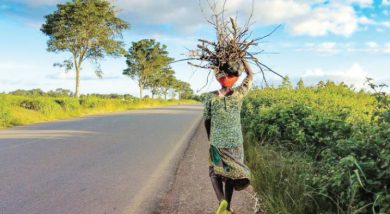Reaping benefits of floods
Descending into the Shire Valley on the southern tip of Malawi, travellers encounter astonishing fields of green maize on the roadside. Thabwa, Kamuzu Bridge, Kasinthula, Nchalo, Bereu and Ngabu, the sights flash past.
As sweltering temperatures return to the sprawling, low-lying plain hit hard by floods in early March, the green fields in Chikwawa District wear the face of stubborn survivors who were quick to replant. Their resistance to give in while many were waiting for food aid in overcrowded evacuation camps is paying off as they sell green maize to vendors.

As many people in affected districts are still counting the losses, Grace Bulagiyo is counting down to a bumper harvest on her maize field the size of a football pitch.
The crop lies near Kamuzu Bridge on the Shire River where its tributary, Likhubula, ripped the M1 tarmac and buried crops in mud. The flooding also shattered her home in Samson Village in Traditional Authority Makhuwira to debris.
“It rained heavily for three days and Likhubula broke its banks, washing away everything on its way. At that time, my friends had started harvesting. Had I known, I would have harvested mine too,” she says
A week after the severe floods occurred in 15 districts, Bulagiyo was seen replanting in her flattened field. The skies were still cloudy and gardens muddy. To talk to her, one had to walk knee-deep in mud.
But the wet conditions did not stop her from going back to the spot where a bumper crop stood no more.
“I’ve to replant while soils are moist and fertile,” she said. “If I delay, my grandchildren will starve. If floods come again, I will replant again. If the clouds have mercy, the maize will be ready for harvesting by the time displaced people return home to rebuild.”
That was on March 12, at the height of hunger caused by two consecutive years of drought. At the nearby Dyeratu Market, Bulagiyo was shelling K1 200 for a bucketful of maize that cost four times less on New Year.
The food shortage caused by extreme weather conditions jolted Bulagiyo and her neighbours to take a swift step in a desperate race to overcome hunger and poverty.
Currently, busloads of people passing by the second crop nearing harvest admire how the affected communities took advantage of the devastating floods to escape hunger.
“Much as floods have negative impacts, such as loss of lives, homes, crops, livestock and roads, they can be advantageous if utilised. They leave behind a lot of moisture and fertile deposits favourable for replanting,” says Joseph Chikoya, district agricultural development officer in Chikwawa.
The agriculturalist worked in Karonga on the northern tip of Lake Malawi, were expansive flood-irrigated rice fields offers numerous lessons on how to turn flooding into a tool for community-based adaptation to adverse effects of climate-related weather shocks.
He offers flashbacks of cultural shocks in his line of duty: “When I was in Karonga, floods occurred almost every year. So, we went to Chitipa District for upstream conservation interventions to reduce the impact of floods downstream, but rice-producing communities told us pointblank floods are good.
“After the floods, they produce a lot of rice. When there are no floods, the yields are low. We need to build on such indigenous knowledge to use floods to overcome food shortages and poverty caused by floods.”
Flooding is not uncommon in the country, with the 2015 and 2019 billed as the worst in history.
This year, the Ministry of Agriculture, Irrigation and Water Development distributed 140 metric tonnes of maize seed and 40 000 bundles of sweet potato vines in Chikwawa.
“Nowadays, the ministry has introduced flood-based agriculture in response to the country’s vulnerability. We sensitise farmers to look at the positive side of floods. As rains are becoming unpredictable, floods can help farmers harvest more without using fertliser ,” says Chikoya.
Water Harvesting Association of Malawi chairperson McPherson Nthala urges government and non-governmental organisatons to invest more in floodplain farming systems to lessen the suffering of flood survivors.
He states: “Floods are not entirely bad. When floods occur, farmers stand to benefit if they get requisite information, know-how and inputs. We need to do more in this field as the rainy season is becoming shorter and unpredictable. Actually, farmers in vulnerable areas harvest more from flood-based farming than rain-fed agriculture.
Truly, Bulagiyo gazes at higher yield than the one gone into the country’s largest river which flows into the Zambezi on descent to the Indian Ocean.
She says: “The floods left many people heartbroken, but I can afford a smile. I’m most likely to harvest twice what the floods wiped out.” n





